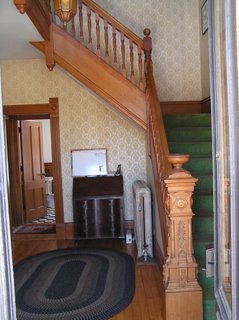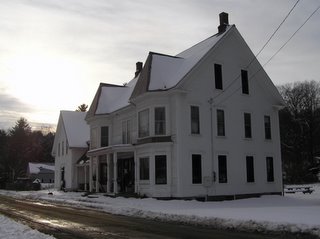A Place to Start

I don't think I have any lock on what will and what won't work in this business. But I can describe my own situation and the things I have learned from it. I think I can say there are some things that make it more likely to work well.
My basic premise is that by combining resources, my residents and I are able to live at a higher standard of living. I am selling them the ability to not worry about the details of keeping the household going. It is my responsibility to anticipate the needs of my residents and manage the resources in a way that is sustainable.
My house is a large Victorian farmhouse. It was built in the common style of a Mainhouse (about 2500 SQF), a Barn (about 2500 SQF) and an Elle (about 1000 SQF) that connects the Mainhouse to the Barn. All of the rented bedrooms and common areas are contained in the Main house. The Elle has my own bedroom and some private rooms for myself and my fiancee. The barn was converted from a horse barn long ago and now provides unheated storage and private workshop space.
In general, here needs to be enough space for everyone included in your household. Kind of like chickens, people require a certain amount of space per person to prevent squabbling. I don't know what that square footage is, but a private room less than 10x8 (80 SQF) is probably not enough. That's just enough room for a single bed, dresser, door swing and an aisleway between. People like a little more than that in terms of a private refuge to call their own. Here, the smallest room is about 10X12 (120 SQF). It's small and it takes a special kind of person to be happy there. The other two rooms are more like 15X16 (240) and that is a large comfortable room.
There needs to be adequate shower facilities to serve the household. I have found the choke point is the available showers/bathroom time in the morning. Some people take longer in the bathrooms than others, but I have found the minimum is about 20 minutes per person. The math is that if you have 1 bathroom for three people, that means someone needs to be getting up as much as an hour and a half before they need to leave the house. If people can leave the house at staggered times, that can help a lot, but you can't always depend on that. I have found that three people is about the comfortable limit on a bathroom. If there is an extra half bathroom (no shower) that can help a lot.
Utilities, the household has to be up and running before residents move in and after they move out. I have found it is easiest to include heat and electric utilities in the rent. I have limits and a cost sharing arrangement kicks in if the usage goes beyond the limits. This arrangement rewards residents for conserving energy, allows me better plan my business and agrees with my conservation ethics.
Parking. It may sound like a minor detail, but adequate parking is important to prevent conflicts. If parking is in perpetual short supply, that is going to control the moods of residents as they arrive home and set the tone in the household. I have found that there needs to be an extra parking spot for about every four people to allow for visitors. We live in a rural area and public transportation is not available. Access to a bus or train system would be a significant plus and might lessen the importance of parking.
Common areas are disputable. In most situations, there is going to be a necessity of common hallways at least to provide access to rented bedrooms. Having more than a bedroom to hang out in goes a long way to change the situation from hotel like to home like. There will be all sorts of factors that control if access to a kitchen or laundry is included. If access to kitchen facilities are included, a great deal of economy and comfort go along with them. There might be some people willing to rent a room without kitchen facilities, but the pool of renters will be much smaller. The other problem is renters may bring in hot plates, mini refrigerators, etc if they don't have some other access to kitchen facilities. In my own situation, I don't want any cooking going on outside the kitchen, and I don't like food storage going on elsewhere, either. I give my residents access to my kitchen with dry and refrigerated food storage to avoid having them store / prepare / eat food elsewhere in the house. It also makes the kitchen the center of our social environment. Having common living areas really changes the environment from a motel to a home like environment and many people like that for an extended stay.
Another variable is furniture. There is less investment when furniture is not provided, but the liability of having furniture moved in and out of the house with changeover of residents can easily outway the investment. A furnished household tends to attract people who are looking for a temporary situation and don't want to take on extra details. People who are looking for a permanent home often have their own furniture they would like to bring with them. My preference is to provide a furnished household for my residents. I am very conscious that the more they move in and out, the more opportunities there are for damaging the house. I also prefer temporary people over long term. It does mean that I occasionally have to turn away someone who comes with a household of furniture and appliances. I just find it less disruptive to the household to limit how much people move in with.
Housekeeping. House keeping is a basic piece of maintenance that helps prevent excessive wear and tear as well as giving it a more attractive appearance. There's a lot to do and it would be nice to have everyone in the house participate, but I have not found that realistic. I do give everyone the opportunity to participate, though. I ask that each person keep track of one thing, maybe a bathroom or keeping the kitchen swept. But I generally find it is not worth my time to police them. I generally pick up the slack where ever necessary rather than push people to do some thing that doesn't come naturally to them. Trying to force people to do it just sets an uncomfortable tone is generally more work than doing it myself.
Maintenance. No matter what the situation, every house is going to need maintenance. A newly built home may not need as much maintenance as an older one initially, but there are always going things that come up that need regular maintenance or repair. In our 100 year old farmhouse, I have a regular schedule of maintenance for the boiler and water heater. I have to keep up with the drains. But the exterior is the biggest issue. Keeping up with the paint and other systems that keep the wood dry are the most important to me. Keeping the proper humidity may be the single largest factor in longevity of a home. Although I ask my residents to let me know of any maintenance issues they notice, but I deal with all the issues.
So, the structure needs to provide private space, access to amenities, included utilities. The structure needs to be clean and maintained to provide an attractive and safe environment. And there need to be adequate outdoor facilities like parking. There are more details, but I'll elaborate on those another time.



